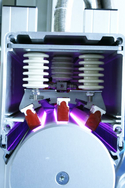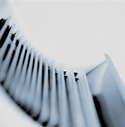Corona: an evolving process
10 April 2007Development of electrodes is of primary importance to Softal
Reaching high treatment levels without stressing or damaging the treated material is a major objective for corona treater manufacturer Softal - one that cannot be achieved by generator power alone. The ability to generate high treatment levels with low corona power, heat management of the polymer surfaces, and the elimination of surface streamers are of the highest importance. Adhesion is the goal, but not at the cost of other material qualities.
Softal claims its Multimesser (Multi Blade) patent “marked the beginning of high performance heat management and has been the basis for modern high power corona electrodes for more than 20 years”.
Originating from the continuous refinement of the Multi Blade concept, the company's Intelliblade is claimed to represent a major breakthrough for high performance corona electrodes. In addition to even more refined heat management, the Intelliblade is said to tackle the issue of surface streamers successfully, and set a new standard for high power, compact, low material stress electrodes.
Risk of damage
Surface streamers originating from the first and last discharge edges or blades of traditional electrodes can create high temperature points to the material that pose a significant risk of stressing or even damaging a material. This may show up as high density points in a print colour or, 'orange peel' effect in cast films. Often, this degradation may not even be noticeable in the surface tension achieved but only affects adhesion strength. The concept of the Intelliblade is in the variable geometric spacing between separate blades of a multi blade electrode. This extremely simple step alters the performance characteristics significantly, as it now provides the opportunity to optimize different parameters independently.
Use of electrical discharges to prepare the surface of plastics films, metal foils or paperboard for converting processes is well known. Corona treatment, which is atmospheric plasma in air, is now the most commonly used process in industrial applications.
Many applications within the converting industry require the use of adhesion promoting primers, an expensive addition to the converting process. Together, Softal and Air Liquide have developed Aldyne, a technology to replace traditional liquid primers with a cost efficient and environmentally friendly”, atmospheric pressure plasma process. In contrast to classic corona treatment, where the plasma process gas is ambient air, the Aldyne process is based on the use of a well defined and controlled gas atmosphere.
This atmosphere is based on nitrogen with additional active gases (dopants) according to the specific needs of the converting process. Nitrogen is the carrier gas and represents more than 99 per cent of the controlled gas atmosphere in a treating station. According to the total consumption, which depends on the web width and the line speed, the nitrogen may be supplied in liquid form from cryogenic storage vessels or dedicated nitrogen generators on-site. The active gases represent a few hundreds of ppm in the mixture and are supplied from cylinders.
The Aldyne process allows control of the chemical reactions within the plasma, as well as on the polymer surface. The results are functional coatings with a thickness of a molecular monolayer, typically 0.3-0.4nm. As Aldyne does not use any liquid or solid substances, there is no accumulation of residue. So, costly cleaning procedures are said to be eliminated.
In addition, with Aldyne a drying process is not required, and the associated problems of removal of organic solvents are eliminated. The molecular coatings can be adapted to each converting process. For example, Amido, Imido, and Amino groups provide excellent adhesion to water based, solvent based, and UV drying inks and lacquers, as well as adhesives, according to Softal.
Aldyne is an in-line process, said to be easily integrated into existing converting lines. Main components are a specially designed plasma source that enables control of the gas down to part per million (ppm) levels, and a gas delivery system. A PC operates a fully automated process control system that incorporates all recipes (gas mixtures and operating conditions), and the electrical and gas flow parameters, with default alarms reported to the supervisor.
Applications currently in operation with “well known” converting companies are said to include production of decorative laminates and special adhesive tapes.
| Contact |
| Softal |



